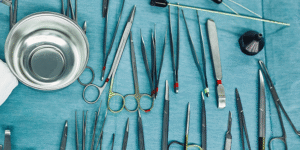In the ever-evolving world of healthcare technology, material science is playing a critical role in shaping the future of surgical instruments. While precision engineering defines the structure and performance, it’s the materials behind those tools that determine their safety, durability, and functionality.
As the demand for minimally invasive procedures, customized tools, and biocompatible solutions grows, medical manufacturers must turn to advanced materials to meet industry needs. In this blog, we’ll explore how material science is revolutionizing the surgical manufacturing landscape, and why it matters more than ever for innovation, patient outcomes, and global competitiveness.
What is Material Science and Why Does It Matter in Surgery?
Material science involves the study and application of materials — metals, polymers, ceramics, and composites — to develop new products and improve existing ones. In the context of surgical instruments, this means:
Increasing tool lifespan
Enhancing biocompatibility
Reducing instrument failure
Meeting strict sterilization and safety standards
Modern surgical tools are expected to perform under extreme stress, precision, and in sterile environments — all while interacting with human tissue. That’s where advanced materials come into play.
Key Materials Driving Innovation in Surgical Instruments
1. Titanium Alloys
Titanium is a top choice for orthopedic implants and surgical tools due to its exceptional strength-to-weight ratio, biocompatibility, and resistance to corrosion. It’s also MRI-compatible and non-reactive in the human body, making it ideal for:
Bone screws and plates
Retractors
Arthroscopic tools
Neurosurgical instruments
2. Stainless Steel (316L & 440C)
Stainless steel is widely used in surgical manufacturing thanks to its hardness, durability, and ease of sterilization. High-grade stainless steel is particularly valuable for instruments that must be reused and autoclaved repeatedly, such as:
Scalpels and forceps
Scissors and clamps
Needle holders
Orthopedic drills
3. PEEK (Polyether ether ketone)
PEEK is a high-performance biocompatible polymer used in implants and instrument handles. It’s radiolucent (invisible on X-rays), lightweight, and chemically resistant. It’s also gaining traction in minimally invasive surgery (MIS) tools and spinal implants.
4. Ceramic Coatings & Surface Treatments
Material science also focuses on surface engineering — applying ceramic or diamond-like carbon (DLC) coatings to improve wear resistance, reduce friction, and prevent microbial growth. This extends tool lifespan and improves surgical accuracy.
How Material Advancements Improve Surgical Outcomes
Innovations in material science directly impact safety, efficiency, and patient recovery. Here’s how:
Increased Instrument Durability
High-performance materials ensure surgical tools maintain sharpness, strength, and precision — even after hundreds of sterilization cycles.
Reduced Risk of Infection
Antimicrobial coatings and corrosion-resistant materials reduce contamination risk, a top priority in operating rooms.
Enhanced Ergonomics and Precision
Material design enables lighter, more ergonomic instruments, reducing fatigue for surgeons and improving control during complex procedures.
Compatibility with Modern Imaging
Radiolucent or non-magnetic materials allow for safe intraoperative imaging without distortion, essential for procedures like spine and brain surgery.
Material Science & Sustainability in Surgical Manufacturing
With global healthcare systems under pressure to reduce waste and carbon footprints, sustainable material choices are becoming increasingly important.
At Teton Surgical, we prioritize environmentally conscious manufacturing by:
Using recyclable and long-life materials
Reducing waste through optimized CNC machining
Implementing energy-efficient production methods
Offering single-use and reusable instrument options based on application
This approach not only benefits the environment but also aligns with global regulatory trends and customer expectations.
Why OEMs and Medical Startups Should Prioritize Material Science
For OEM partners and medical device innovators, material science is a critical differentiator in:
Product performance
Regulatory compliance
Brand reputation
Choosing the right material during product development impacts everything from FDA approval timelines to surgeon satisfaction and patient safety.
At Teton Surgical, we collaborate closely with clients to:
Select the ideal materials for each application
Prototype and test under real-world conditions
Ensure long-term durability and biocompatibility
Comply with ISO 13485 and other global standards
Material science is not just supporting innovation in surgical instruments — it’s driving it. From high-strength alloys to advanced polymers, the right materials make all the difference in achieving superior surgical outcomes and advancing medical care.
At Teton Surgical, we combine cutting-edge material knowledge with world-class precision manufacturing to deliver the next generation of orthopedic and surgical solutions.
Want to build the future of surgery with us?
Contact Teton Surgical to explore how our material and engineering expertise can power your next medical breakthrough.








Add comment